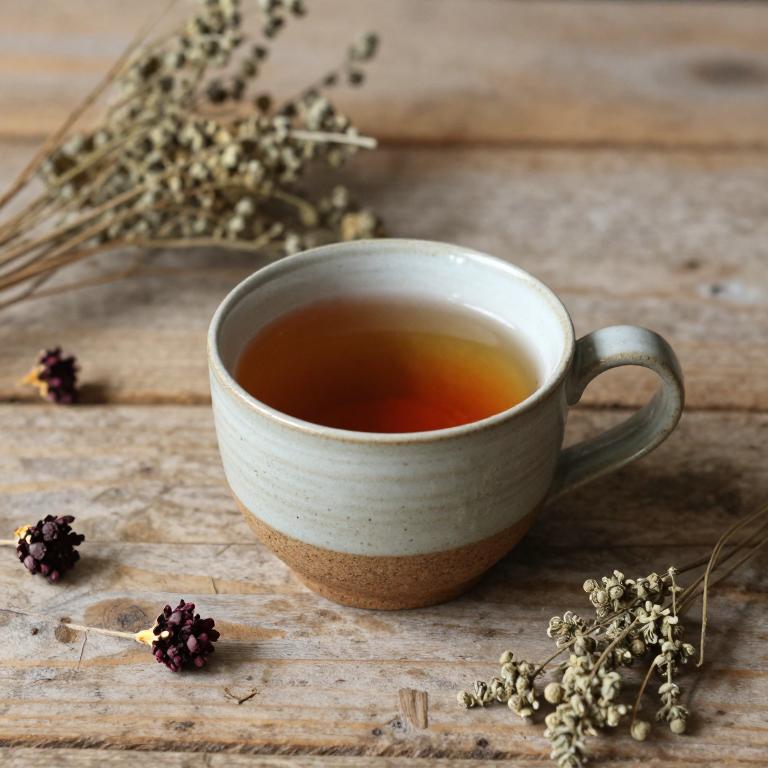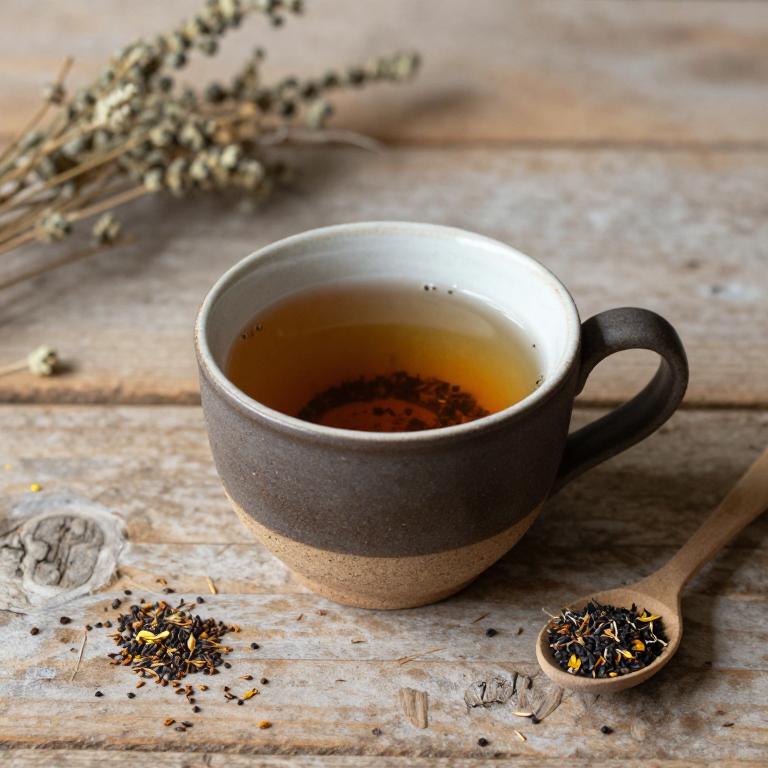10 Best Herbal Teas For Endometriosis

Herbal teas have gained attention as a complementary approach for managing symptoms of endometriosis, with certain herbs believed to help reduce inflammation and regulate hormonal balance.
Commonly used herbs include chasteberry, turmeric, ginger, and green tea, each offering potential anti-inflammatory and antioxidant properties that may support overall reproductive health. While these teas are not a cure for endometriosis, they may help alleviate pain, menstrual cramps, and digestive issues often associated with the condition. It is important to consult with a healthcare provider before incorporating herbal teas into a treatment plan, as some herbs can interact with medications or have side effects.
Overall, herbal teas can be a soothing addition to a holistic approach for managing endometriosis symptoms.
Table of Contents
- 1. Chaste tree (Vitex agnus-castus)
- 2. Black cohosh (Cimicifuga racemosa)
- 3. Turmeric (Curcuma longa)
- 4. Stinging nettle (Urtica dioica)
- 5. Thistle (Silybum marianum)
- 6. Salvia (Salvia officinalis)
- 7. Fennel (Foeniculum vulgare)
- 8. Black cumin (Nigella sativa)
- 9. St. john's wort (Hypericum perforatum)
- 10. Dog rose (Rosa canina)
1. Chaste tree (Vitex agnus-castus)

Vitex agnus-castus, commonly known as chaste tree or vitex, is a herbal remedy often used to support hormonal balance, particularly in women's health.
It is traditionally used to regulate menstrual cycles and may help alleviate symptoms associated with conditions like endometriosis by influencing prolactin levels and estrogen metabolism. While scientific research on its effectiveness for endometriosis is limited, some studies suggest it may reduce inflammation and promote hormonal equilibrium. Many women report relief from menstrual pain and irregularity when using vitex-based teas, though it is important to consult a healthcare provider before starting any herbal treatment.
As a complementary therapy, vitex agnus-castus herbal tea may offer supportive benefits for managing endometriosis symptoms when used alongside conventional medical care.
2. Black cohosh (Cimicifuga racemosa)

Cimicifuga racemosa, commonly known as black cohosh, is a herbal remedy that has been traditionally used to alleviate symptoms associated with menopause and hormonal imbalances.
For women with endometriosis, this herb may help reduce pelvic pain and menstrual discomfort due to its potential estrogen-modulating effects. While research on its efficacy for endometriosis is limited, some studies suggest it may help regulate menstrual cycles and ease cramping. It is often used as a complementary therapy alongside conventional treatments, though it should be used under the guidance of a healthcare professional.
As with any herbal supplement, it is important to consider potential side effects and interactions with other medications.
3. Turmeric (Curcuma longa)

Curcuma longa, commonly known as turmeric, has been traditionally used in herbal medicine for its anti-inflammatory and antioxidant properties, which may offer potential benefits for individuals with endometriosis.
The active compound in turmeric, curcumin, has shown promise in reducing inflammation and oxidative stress, both of which are associated with the progression of endometriosis. While scientific research is still ongoing, some studies suggest that curcumin may help alleviate pelvic pain and reduce the size of endometrial lesions. However, it is important to note that curcuma longa herbal teas should not replace conventional medical treatments but may be used as a complementary therapy under the guidance of a healthcare professional.
As with any herbal supplement, it is essential to consider individual health conditions and potential interactions with other medications.
4. Stinging nettle (Urtica dioica)

Urtica dioica, commonly known as stinging nettle, is a herbal remedy that has been explored for its potential benefits in managing symptoms of endometriosis.
This plant is rich in nutrients such as iron, calcium, and antioxidants, which may support overall hormonal balance and reduce inflammation in the body. Some studies suggest that stinging nettle may help regulate estrogen levels, which is particularly important for women with endometriosis, as hormonal imbalances are often a contributing factor. Herbal teas made from Urtica dioica can be consumed regularly to support digestive health and alleviate cramping and pain associated with the condition.
However, it is essential to consult with a healthcare provider before using stinging nettle tea, as it may interact with certain medications or have side effects in some individuals.
5. Thistle (Silybum marianum)

Silybum marianum, also known as milk thistle, is a herbal remedy that has been explored for its potential benefits in managing symptoms of endometriosis.
This herb is rich in antioxidants, particularly silymarin, which may help reduce inflammation and oxidative stress—both of which are commonly associated with endometriosis. While scientific research on its direct impact on endometriosis is limited, some studies suggest that silymarin may support liver function and hormone regulation, which could indirectly benefit women with this condition. Herbal teas made from silybum marianum are often consumed for their potential to support overall reproductive health and reduce menstrual discomfort.
However, it is important to consult with a healthcare provider before using this herb, as it may interact with certain medications or have side effects in some individuals.
6. Salvia (Salvia officinalis)

Salvia officinalis, commonly known as sage, has been traditionally used in herbal medicine for its potential health benefits, including its role in supporting women's health.
Some studies suggest that sage may help regulate hormone levels, which could be beneficial for women with endometriosis, a condition often linked to hormonal imbalances. Herbal teas made from sage leaves are often consumed to promote hormonal balance and reduce inflammation, which are key factors in managing endometriosis symptoms. However, it is important to consult with a healthcare professional before using sage tea, as it may interact with certain medications or have side effects in some individuals.
While sage tea may offer supportive benefits, it should not be considered a substitute for conventional medical treatment for endometriosis.
7. Fennel (Foeniculum vulgare)

Foeniculum vulgare, commonly known as fennel, is often used in herbal teas to support women's health, including those with endometriosis.
The essential oils in fennel, particularly anethole, have mild estrogenic properties that may help regulate hormonal imbalances associated with the condition. While not a cure, fennel tea may help alleviate symptoms such as cramping and bloating by promoting uterine relaxation and reducing inflammation. It is typically consumed as a warm infusion, often combined with other herbs like ginger or chamomile for enhanced comfort.
However, it is important to consult a healthcare provider before using fennel tea, especially during pregnancy or if taking other medications.
8. Black cumin (Nigella sativa)

Nigella sativa, commonly known as black cumin, has been traditionally used in herbal medicine for its anti-inflammatory and antioxidant properties, which may offer potential benefits for individuals with endometriosis.
Studies suggest that the active compound thymoquinone in nigella sativa may help reduce oxidative stress and inflammation, both of which are implicated in the progression of endometriosis. While research on its efficacy for endometriosis is still emerging, some preliminary studies indicate that it may support hormonal balance and alleviate symptoms such as pelvic pain and menstrual discomfort. However, it is important to consult with a healthcare provider before using nigella sativa as a complementary therapy, as it may interact with other medications or treatments.
Incorporating nigella sativa herbal tea into a holistic approach may provide supportive relief, but it should not replace conventional medical care for endometriosis.
9. St. john's wort (Hypericum perforatum)

Hypericum perforatum, commonly known as St. John's wort, is a herbal tea that has been traditionally used for its potential therapeutic effects on mood and inflammation.
While it is well-known for its antidepressant properties, some studies suggest that it may also have anti-inflammatory and pain-relieving effects, which could be beneficial for individuals with endometriosis. The active compounds in St. John's wort, such as hypericin and hyperforin, are believed to contribute to its anti-inflammatory and analgesic properties. However, it is important to note that hypericum perforatum can interact with various medications, including hormonal treatments for endometriosis, so it should be used under the guidance of a healthcare professional.
Despite its potential benefits, more research is needed to fully understand its efficacy and safety for managing endometriosis symptoms.
10. Dog rose (Rosa canina)

Rosa canina, commonly known as rosehip, is a herbal tea that has gained attention for its potential benefits in managing endometriosis due to its high content of antioxidants, vitamins, and anti-inflammatory properties.
This natural remedy may help reduce inflammation and oxidative stress, which are often associated with endometriosis-related pain and tissue damage. While it is not a cure, some studies suggest that regular consumption of rosehip tea could support overall hormonal balance and immune function, which are crucial for individuals dealing with this condition. However, it is important to consult with a healthcare provider before using rosehip tea as part of a treatment plan, especially if undergoing other medical therapies.
Incorporating rosehip tea into a holistic approach may offer complementary relief and contribute to improved well-being for those affected by endometriosis.